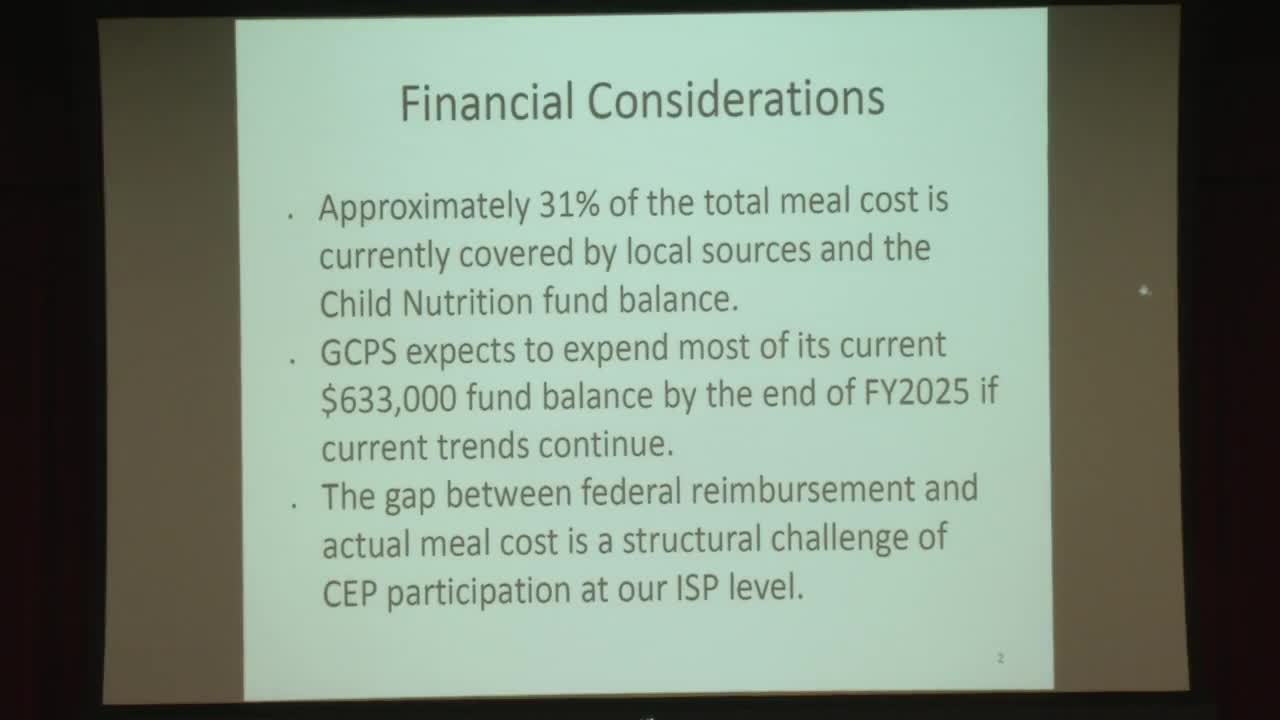Gloucester school board votes to end universal free meals, revert to paid model for 2025–26
Get AI-powered insights, summaries, and transcripts
Subscribe
Summary
After reviewing food-service finances and projected reserves, the Gloucester County School Board voted to end its full Community Eligibility Provision (CEP) participation and revert to a paid meal model for the 2025–26 school year, while asking staff to notify the Board of Supervisors and seek transitional supports for families.
The Gloucester County School Board voted unanimously on June 10 to end districtwide participation in the Community Eligibility Provision (CEP) and revert to a paid school meal model for the 2025–26 school year, citing the program’s cost to the school food-service fund and the depletion of reserves.
Board members and food-service officials told the board that the district’s CEP rollout had used most of its fund balance. Presenters said the food-service fund began the year with roughly $633,000 in reserves and that continuing all schools under CEP would exhaust that balance after accounting for summer payroll and other year-end costs. The board asked staff to notify the Gloucester County Board of Supervisors about the change and to request any available county support for the food-service fund during the transition.
Why it matters: CEP lets qualifying schools offer free breakfast and lunch to all students, but federal reimbursements do not always cover actual meal costs. Board members said the district could not sustain districtwide CEP without outside funding, and that a return to a paid model will reduce pressure on division finances while staff work to limit harm to families.
School officials described near-term steps and constraints. The division must notify state officials of its meal-model choice by June 30. The district also has a 30-school-day window at the start of the school year during which students retain free status while families receive information about new payment rules — a short period staff said they will use to communicate options, free-or-reduced eligibility, and enrollment assistance.
Finance and program details - Presenters said the food-service fund had roughly $633,000 in reserves at the start of the year and projected that reserves would be exhausted if CEP continued for all schools. (Presenters’ figures and timeline were given in the board presentation.) - Summer feeding and CEP rely on federal reimbursements and direct certification (SNAP-based lists). Presenters warned that changes in federal SNAP funding could reduce the number of directly certified students and the district’s CEP reimbursement rate. - Staff described possible mitigation steps under a return-to-paid model: active outreach for free-and-reduced-price applications, monitoring and managing meal charges, making paper and online applications available at open houses and through schools, and using principal-level sign-offs only when all other efforts fail.
Board comments and vote Board member discussion emphasized the limited options. “I don't think we have really much choice other than to revert back to a a fee based model,” one member said during the discussion. The board approved a motion to revert to a paid model and to ask staff to communicate the decision to county officials and to request that any county allocation intended for CEP be considered for fund-balance stabilization or emergency needs.
What’s next Staff said they would notify the Board of Supervisors about the decision, finalize communication and outreach plans for families over the summer, and prepare for the required state reporting deadline. Several board members asked staff to pursue transitional supports that would reduce the risk that students would miss meals while families adjust.
The board also discussed operational details staff plan to use in outreach: summer open houses and phone campaigns, targeted monitoring of student meal charges, and continued collaboration with Transportation and Food Services for logistics.
The action does not change the district’s summer feeding program or other federally funded feeding initiatives; staff described those summer services as continuing independently of the CEP decision.
